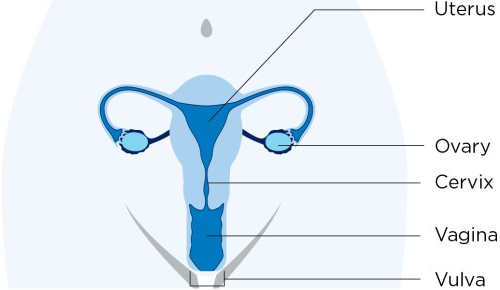Know Your Risk for Gynecologic Cancer
Gynecologic cancer is any cancer that starts in the female reproductive organs. A risk factor is anything that increases your chance of getting a disease, such as cancer. Having a human papillomavirus (HPV) infection is the most common risk factor for several types of gynecologic cancer. There are 5 main types of gynecologic cancer:
- Cervical
- Ovarian
- Uterine (endometrial)
- Vaginal
- Vulvar

Getting the HPV vaccine is one thing you can do to protect yourself from some types of gynecologic cancer. Anyone between the ages of 9 and 45 years old can get the HPV vaccine. Ask your healthcare provider about your risk of developing gynecologic cancer and about getting the HPV vaccine.
Some risk factors for gynecologic cancers do not change, such as your age, race, health history, and your genes. But you can lower your risk by starting some healthy habits. The first step in prevention is learning your personal risk factors for each gynecologic cancer.
Risk Factors for Cervical Cancer
- You have an active or a past HPV or an HIV infection.
- You began to have sex at an early age.
- You have had many sexual partners.
- You smoke or use tobacco.
- You are Hispanic.
Risk Factors for Ovarian Cancer
- You have a gene mutation, including BRCA1 or BRCA2, or genes associated with Lynch syndrome or ovarian cancer.
- You have a personal history of endometriosis (tissue that normally lines your uterus grows outside your uterus).
- You had ovarian or breast cancer.
- You are Eastern European or Ashkenazi Jewish.
Risk Factors for Uterine (endometrial) Cancer
- You have been diagnosed with Lynch syndrome.
- You are obese or are about 50 pounds (22 kilograms) or more overweight.
- You are 50 years or older.
- You have endometrial hyperplasia (en-DOH-mee-TREE-uhl HIE-pur-PLAY-zeu)
- You have a PTEN gene mutation (Cowden’s syndrome).
- You have used tamoxifen (such as Nolvadex® or Soltamox®).
- You had estrogen hormone replacement therapy without progesterone.
Risk Factors for Vulvar or Vaginal Cancer
- You have an HPV infection.
- You have had cervical or vulvar cancer or precancers (cells that show changes but are not yet cancer).
- You have a weakened immune system (from an HIV infection or other condition).
- You smoke or use tobacco products.
- You often have vulvar itching or burning, called lichen sclerosus (LIE-kun skluh ROW-sus).
| Symptoms | Cervical | Ovarian | Uterine | Vaginal | Vulvar |
|---|---|---|---|---|---|
| Abnormal bleeding or discharge from your vagina | X | X | X | X | |
| Problems eating or feeling full very fast | X | ||||
| Unexpected weight gain or weight loss | X | X | |||
| Pain or pressure in your pelvis | X | X | X | ||
| Need to urinate (pee) urgently or more often | X | X | |||
| Constipation (pooping less often than usual) | X | X | |||
| Bleeding from your vagina after sex | X | ||||
| Bloating (your stomach feels full and tight) | X | ||||
| Pain in your back or abdomen (belly) | X | ||||
| Pain during vaginal sex | X | X | X | ||
| Itching, burning, pain, or tenderness in your vulva | X | ||||
| Changes in color or rashes, sores, or warts in your vulva | X |
Healthy Habits to Reduce Your Risk for Gynecologic Cancer
The only gynecologic cancer we can screen for with a simple, reliable test is cervical cancer. That’s why it’s important to look for symptoms and talk with your healthcare provider right away if you notice any changes.
MSK recommends following these healthy habits to lower your risk for gynecologic cancer.
- Get vaccinated for HPV if you are between 9 and 45 years old. Talk with your healthcare provider about when you or a family member should get the HPV vaccine. More people are now able to get vaccinated. They can protect themselves against the types of HPV that most often cause cervical, vaginal, and vulvar cancers.
- Schedule regular Pap tests. MSK strongly recommends you get regular Pap tests, even if you have had an HPV vaccine. The Pap test, or Pap smear, checks the cells in your cervix for any changes that can become cancer. If you were assigned female at birth (your gender now does not matter), you probably have a cervix.
- Use condoms or dental dams during sexual activity to lower the risk of getting HPV. Dental dams are a thin sheet that protects against mouth-to-skin contact.
- Do not smoke or use tobacco products.
- Exercise for at least 20 minutes a day. Try mixing up aerobic and muscle-strengthening activities. A few examples are walking, dancing, yoga, using resistance bands, or riding a bike. Cleaning your house and taking the stairs are also forms of physical activity.
Actions You Can Take Today
- Learn about your risk for gynecologic cancer.
- Know the symptoms of gynecologic cancer and talk with your healthcare provider about any changes in your body.
- Get the HPV vaccine.
- Get screened for cervical cancer with regular Pap smears.
- Talk with a genetic counselor if you have a family history of gynecologic cancer. They can also help you get tested for a gene mutation (change or variant) that raises your risk.